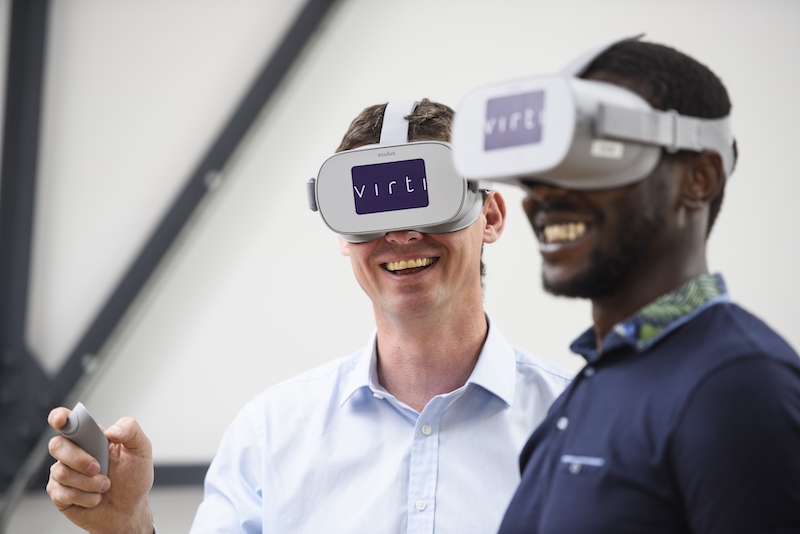Virti Brings Immersive Learning solution for Simulation and Training

On November 21st, 2021 the Bristol Cricket Club partnered with Virti to improve the way players train and maintain core skills during off-season using VR technology.
This is the first time that amateur sports teams have used cutting-edge deep learning technology from Virti in order to improve training and performance.
The 158-year old club hopes that VR training will be introduced to increase player engagement and allow athletes to reach their peak performance.
The club's Stapleton grounds filmed the combination of slow-motion, drone captured and 360-degree VR training footage. It was directed by the coaching staff.
These videos are 30 minutes long and cover skills such as batting and bowling. They also include instructions for beginners and children. The club is working on additional modules and will make use of the expertise of senior players and coaches in order to improve performance.
You can access the videos from any device, including a smartphone, tablet, or VR/AR headset. The platform's AI analyzes data about each player's performance and provides coaching teams with remote monitoring.
Damian Forder, the first Stapleton Cricket Club coach, said that the response to VR training has been extremely positive with junior and senior club players showing genuine enthusiasm to learn virtual cricket. Cricket requires a high level technical skill from all players. The practice of core skills in VR environments has been shown to increase confidence, skill level, and retention in cricket. In some cases it can even be up to 230%
Virti plans to partner with more athletes and sports teams in the region, both at an amateur and professional level, over the next twelve months.
Virti Raises 10 million USD Series A From Investors
In April 2019, Virti secured a seed round of $2 million USD. In June 2021, Virti received another $10 million from IQ Capital in a Series B round with participation by Cedars-Sinai, Kurt Kratchman and Mark Ashworth, who also joined Virti as Virti's new CRO and CFO/COO.
Virti was founded in Bristol, U.K. The platform captures data from mobile and desktop devices as well as VR/AR headsets. It can analyze, measure, and give feedback about employee performance. This transforms subjective skills into objective and measurable data. It was even named one of TIME’s Top Inventions of 2020.
This funding comes at an important time for the startup, as demand for remote training solutions has increased dramatically in recent years. Virti saw its revenues grow by 978% and its workforce expand by twofold. Virti will be able to expand its international expansion, continue researching and developing new technologies that improve human performance, with the capital raised in this round.
Virti claims that its deep learning technology improves training outcomes by as much as 230%. The startups claim it has also increased revenue by 978%. It also offers a cloud-based, non-code simulation creation suite that allows organizations to create their own training modules.
Dr. Alexander Young, founder and CEO of Virti, stated that Virti's mission is to increase human performance through experiential learning. E-learning is often more affordable than in-person training. Research has shown that employees forget up to 80% of episodic training.
On-the-job training is often a serendipitous experience. The learning experience can vary depending on the location, the day and the person who is doing it. In most situations, soft skills are subjectively evaluated. Virti offers the tools that organizations need to create and distribute evidence-based training. This can be standardized across different organizations and geographical regions. Our platform provides data insights that reduce variability in training and provide objective feedback that can be used to improve human performance.
Max Bautin is a managing partner of IQ Capital. He stated that E-learning has experienced strong growth over 5 years and that the COVID-driven shift towards remote work has increased the demand many times. Virti's deep-tech experiential learning platform for deep tech is the best in the country.
Virti is competitive with traditional desktop-based training systems. However, VR is a more attractive option than StriVR which raised $51million and Mursiun which raised $35.1million.
Young claims that the Virti system can track what people see when they are wearing a virtual reality headset. The system can pull out deep engagement metrics similar to heatmap data seen on marketing platforms. Virti then uses this data to predict how people will perform in real-world situations. Another aspect is that 80% of the information a trainee can learn is lost if they don't practice it. The Virti system makes it easy for people to get back in and remind them. It's also accessible via mobile and VR/AR headsets so they can keep up with the latest and greatest learning opportunities.
Growth during the Covid-19 Crisis
Many organizations are having difficulty engaging and scaling their workforce in order to increase skills, due to the pandemic. Virti believes that it has been tackling the problem. According to the company, deep learning technology can improve training outcomes by as much as 230 percent and support individuals and organisations in their global shift to remote and flexible work.
According to Virti in the US, medical students have used Virti’s NLP-powered virtual person to practice soft skills like explaining diagnoses, building trust with patients, and dealing with difficult situations. This platform can also be used to facilitate mass training of medics from developing countries by allowing global expertise to be "beamed in" from hospitals around the globe.
Virti's technology can be used not only by the healthcare industry, but also by corporations and public sector companies for teaching soft skills such as crisis management and mindfulness. The platform was also used during the pandemic in order to quickly and remotely train frontline healthcare workers in PPE use, navigation, and managing infection risk.
Somerset NHS Foundation Trust launches VR training
The Somerset NHS Foundation Trust introduced virtual reality training in August 2021 to enhance learning among its junior doctors and medical students. The trust, in collaboration with Virti has created a VR headset and hand-held controls that allow users to immerse themselves in virtual operations. This allows them to understand the skills needed for real-life situations.
Students and junior doctors can use the technology to communicate with patients and their families, as well as to manage difficult situations.
This learning style is meant to complement and not replace real-life training. It eliminates the need for students attending the hospital, which was vital during the pandemic. Because they can be scaled, repeated, and immersive, VR simulations are more memorable and impactful for students than traditional learning methods.

